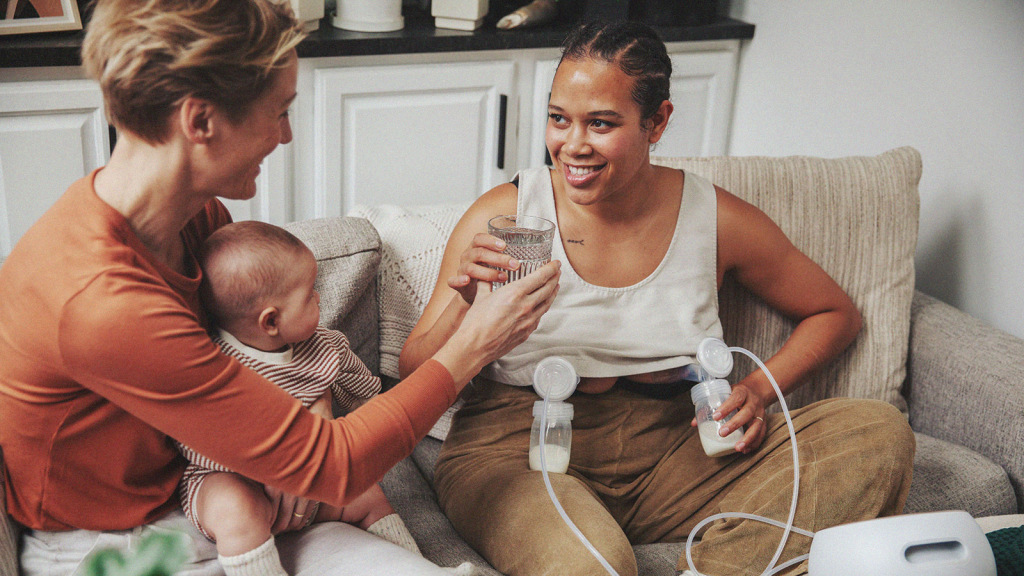Love and Marriage After Baby
The Haven Group answers the most common questions about nurturing your relationship with your spouse after baby
When your bundle of joy comes home, focusing on anything other than making sure that baby is fed, comfortable and has a clean diaper is damn near impossible. While caring for a newborn is a full-time job, it’s equally important to take care of yourself and your relationship with your spouse. But in a time when even taking a shower feels like a win, how do you prioritize your relationship with your significant other? Too often, new parents fail to tend to their relationship as spouses amid the many other demands on their time and energy. But the strength of your partnership is central to your parenting journey, and it’s crucial that you treat it with equal care. We asked our friends at The Haven Group to share some key challenges and information on how to focus on your relationship after baby.
What are the biggest challenges couples face in their relationships after having a baby?
We find that many couples have a difficult time adjusting to the way their roles change as they become parents. They’ve each added something to their identity—and certainly to their list of responsibilities—and this can be overwhelming both individually and as a team. Having a new baby can also cause some tension, and even jealousy, as the baby demands lots of time and attention. This can leave one or both parents feeling a sense of loss as they adjust to the new norm and their new ways of relating to one another. Generally speaking, the sleep deprivation that couples experience post-baby can also be hugely challenging, as it leaves their mental and emotional functioning at a deficit.
How long can couples expect the adjustment period to last after baby?
The timeframe really varies from couple to couple, depending on a variety of factors. The more open and honest couples can be, the faster things can turn around. We encourage couples to give each other feedback (lovingly!) and to share their perspectives of the adjustments that are happening. New parents have never done this before, so there are bound to be some surprises! It’s important to work through those together in order stay on the same team. Families who have support—either friends or family members who come over to pitch in, or hired help—may experience aspects of the adjustment period later than those who do not. Reality can set in at different times for everyone, and will likely be ongoing as families grow and change. It’s important to set up healthy pathways of communication and problem-solving as early as possible. They’ll be beneficial throughout the relationship!
Does every couple have a unique experience?
Yes! There’s no one-size-fits-all experience, especially when it comes to relationships. While it’s hard not to compare ourselves to our friends, neighbors, bloggers, etc., it’s really important to focus on what is or isn’t working within your own family. What may work well for you may not work well for other couples, and vice-versa. Unfortunately, there’s a lot of trial and error during this adjustment period. Try to keep an open mind to ideas and suggestions for improving or maintaining your relationship during this time. Remember that there is no “normal”—if it works for you, it works.
How can couples focus on their partnership while managing the care of a newborn?
Communicate, communicate, communicate! Try to check in with each other about how the other person is doing, what he/she needs, etc. We know that alone time is hard to come by, but make it intentional time when you have it: that may mean enlisting some support from a friend or family member so you have a little time alone together, or saying no to visitors at certain times so that you can focus on being with each other. In addition, don’t be afraid to talk about the not-so-awesome aspects of having a newborn together. It can be such a challenging time, and being able to turn to one another after a sleepless night or a diaper blow-out and say, “wow, that sucked,” is important.
What can couples who have recently welcomed a baby best navigate sexual intimacy?
Intimacy can be tricky after having a baby. Sleep deprivation tends lower libidos, and women often struggle either physically or emotionally with bringing sex back into the relationship. This can be a big change for some couples, and it’s one that needs to be acknowledged. It’s so important to have conversations about each partner’s comfort level, thoughts about sex and ideas for bringing intimacy back. In the meantime, try to find other ways of being either physically or emotionally intimate. It will be helpful in the long run if you’re able to keep the spark going, even if it looks a little different for awhile. Again, remember that there is no “normal” for getting back in the saddle: for some couples it may be six weeks, and others may take 6 months or a year.
What can couples do to connect during the postpartum period?
We’ve seen couples get so creative during this time: at-home date nights, creating a bucket list for the postpartum period and after, creating new rituals for themselves and the family, etc. Any shared experience will help you to stay connected and build a stronger connection. We regularly recommend “The 5 Love Languages” online quiz. It’s a great way to check in about everyone’s emotional needs, and it’s a good conversation starter. The Love Language concept is a great, practical way for couples to identify and practice ways to enhance the love that they give and receive.
What can couples do to receive more support? Is needing couples therapy a bad thing?
It’s important for couples to be honest with themselves and with their support systems when they feel that they could use some help. No one is a super parent, and it’s absolutely ok to ask for more help. We see lots of postpartum couples in our therapy practice. It can be helpful to bring in an unbiased person to help identify areas for improvement or breakdowns in communication. We usually find that, in previously healthy relationships, a little therapy can go a long way. It often takes just a few sessions and some minor changes in patterns and communications to feel a big improvement!
About The Haven Group
Based in Chicago, The Haven Group offers a range of support services for family members. From the early stages of family planning through the transitions into new roles and dynamics, The Haven Group aims to provide comprehensive care that goes beyond the range of a typical mental health professional. As therapists in addition to former birth and postpartum doulas, the clinicians at The Haven Group have unique perspectives on the challenges that women and their families can face in the prenatal and postpartum periods. Through counseling services, The Haven Group strives to assist individuals and families in identifying and managing any areas of new or changing family issues that may be challenging.
For more information about The Haven Group and their services, please contact Jenny and Amanda at [email protected].



